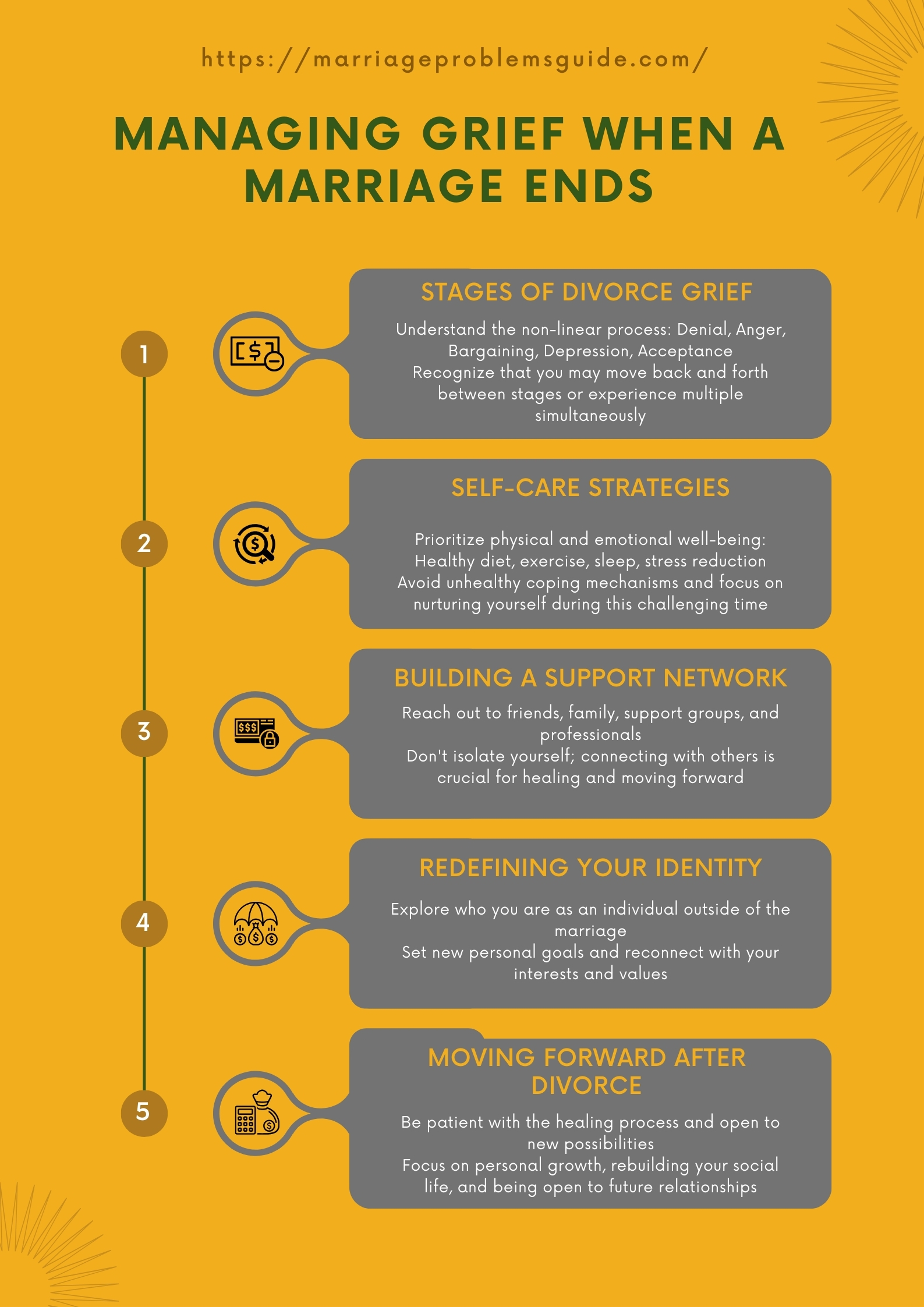The end of a marriage is often compared to experiencing a death, and for good reason. It marks the loss of not just a relationship, but a shared life, dreams, and future plans.
This profound loss triggers a complex grieving process that can be overwhelming and difficult to navigate.
This blog post aims to provide a comprehensive guide to understanding and managing grief when a marriage ends, offering insights, strategies, and support for those going through this challenging life transition.
Understanding Grief in the Context of Divorce
Grief is a natural and necessary response to loss. When a marriage ends, the grief process can be particularly complex due to the multifaceted nature of the loss. It’s important to recognize that grief in divorce is valid and deserves acknowledgment and care.
Types of Loss Experienced in Divorce
- Loss of a life partner and companion
- Loss of shared dreams and future plans
- Loss of daily routines and familiar lifestyle
- Loss of extended family relationships
- Loss of financial stability
- Loss of identity as a married person
The Stages of Grief in Divorce
While grief is not a linear process, understanding the common stages can help normalize the experience:
- Denial
- Anger
- Bargaining
- Depression
- Acceptance

It’s crucial to remember that these stages are not sequential, and individuals may move back and forth between them or experience multiple stages simultaneously.
Recognizing the Emotional Impact of Divorce
The end of a marriage can trigger a wide range of intense emotions. Acknowledging and understanding these feelings is an important step in the healing process.
Common Emotional Responses to Divorce
- Sadness and despair
- Anger and resentment
- Guilt and shame
- Fear and anxiety
- Relief and hope
- Confusion and disorientation
Strategies for Managing Grief During and After Divorce
Coping with grief requires active engagement in the healing process. Here are some effective strategies to help manage grief when a marriage ends:
1. Allow Yourself to Grieve
Give yourself permission to feel and express your emotions. Suppressing feelings can prolong the grieving process and hinder healing.
2. Seek Support
Don’t go through this difficult time alone. Reach out to:
- Friends and family
- Support groups for divorced individuals
- Professional therapists or counselors
- Online communities for divorce support
3. Practice Self-Care
Taking care of your physical and emotional well-being is crucial during this time:
- Maintain a healthy diet
- Engage in regular exercise
- Ensure adequate sleep
- Practice stress-reduction techniques like meditation or yoga
- Avoid unhealthy coping mechanisms like excessive alcohol consumption
4. Create New Routines
Establishing new routines can help create a sense of stability and normalcy:
- Develop a new daily schedule
- Explore new hobbies or interests
- Create new traditions for holidays and special occasions
5. Focus on Personal Growth
Use this time as an opportunity for self-reflection and growth:
- Engage in journaling
- Set personal goals
- Explore your individual identity outside of the marriage
6. Be Patient with the Process
Healing takes time, and the grieving process is different for everyone. Be patient and kind to yourself as you navigate this journey.
Dealing with Specific Challenges in Divorce Grief
Co-Parenting and Grief
For divorcing couples with children, managing grief while co-parenting presents unique challenges:
- Prioritize the well-being of the children
- Maintain clear communication with your ex-spouse
- Seek support in balancing your emotional needs with parenting responsibilities
Managing Grief When You Didn’t Want the Divorce
If you didn’t initiate or want the divorce, the grief can be particularly intense:
- Acknowledge the lack of control in the situation
- Focus on aspects of your life you can control
- Consider professional help to work through feelings of rejection or abandonment
Navigating Grief When the Marriage Ended Due to Infidelity
Infidelity can add layers of complexity to divorce grief:
- Allow yourself to process feelings of betrayal
- Work on rebuilding trust in relationships, even platonic ones
- Consider specialized therapy for affair recovery
The Role of Professional Help in Managing Divorce Grief
Professional support can be invaluable in navigating the complexities of divorce grief:
- Individual therapy
- Group therapy
- Divorce coaching
- Grief counseling
These professionals can provide tools, insights, and support tailored to your specific situation.
Moving Forward: Life After Divorce
While it may seem impossible in the midst of grief, there is life after divorce. Here are some steps to help you move forward:
1. Redefine Your Identity
- Explore who you are as an individual
- Reconnect with personal interests and values
- Set new life goals
2. Rebuild Your Social Life
- Nurture existing friendships
- Join clubs or groups aligned with your interests
- Be open to forming new connections
3. Explore New Possibilities
- Consider career changes or advancements
- Travel to new places
- Learn new skills or hobbies
4. Practice Forgiveness
- Work on forgiving your ex-spouse (and yourself)
- Understand that forgiveness is for your benefit, not theirs
- Seek professional help if struggling with forgiveness
5. Be Open to New Relationships
- Take time to heal before entering new romantic relationships
- Learn from past experiences
- Set healthy boundaries in new relationships
Comparison of Grief Responses in Different Divorce Scenarios
Understanding how grief may manifest in different divorce situations can help normalize your experience:
| Divorce Scenario | Common Grief Responses | Unique Challenges |
|---|---|---|
| Mutual Decision | Sadness, relief, anxiety about the future | Maintaining amicable relations, dividing assets fairly |
| One-Sided Decision | Shock, betrayal, anger, depression | Coping with rejection, rebuilding self-esteem |
| Long-Term Marriage | Deep sense of loss, identity crisis | Adjusting to single life after many years, financial concerns |
| Short-Term Marriage | Disappointment, shame, fear of future relationships | Dealing with societal judgment, rebuilding trust in love |
| Marriage with Children | Guilt, worry about children’s well-being | Balancing personal grief with children’s needs, co-parenting challenges |
| Infidelity-Caused Divorce | Intense anger, trust issues, self-doubt | Healing from betrayal, rebuilding ability to trust others |
Conclusion
Grief is an inevitable part of the divorce process, but it doesn’t have to define your future.
By understanding the nature of divorce grief, implementing coping strategies, seeking support, and focusing on personal growth, it’s possible to navigate this challenging life transition and emerge stronger.
Remember that healing is not linear, and it’s okay to have setbacks.
Be patient with yourself, celebrate small victories, and keep moving forward. With time, effort, and support, you can process your grief, rebuild your life, and open yourself to new possibilities and happiness.
If you’re struggling to manage your grief, don’t hesitate to seek professional help. You don’t have to go through this alone, and there are resources and support available to help you through this difficult time.
The end of a marriage may feel like the end of the world, but it can also be the beginning of a new chapter in your life.
By actively engaging in the grief process and focusing on healing, you can build a fulfilling and joyful life after divorce.










